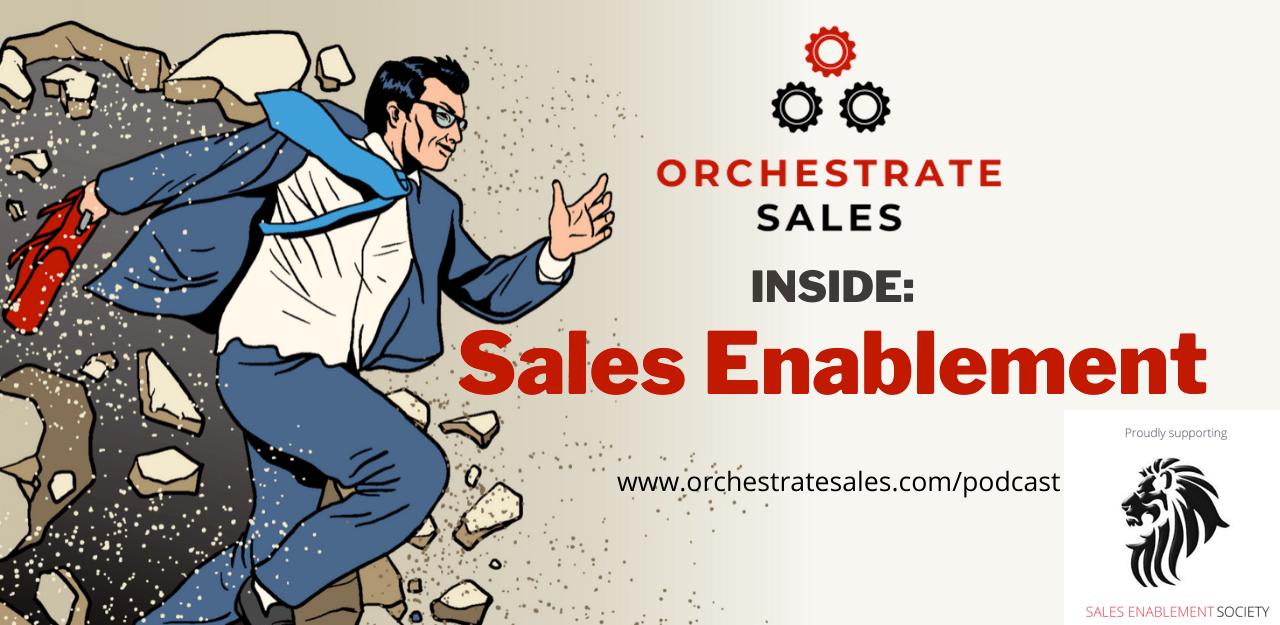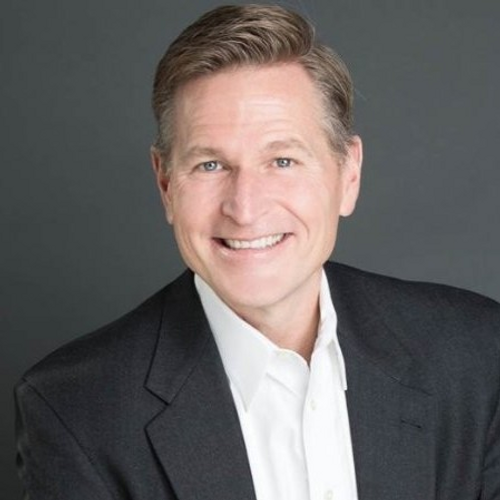Ep21 What’s the $%@# Problem? Moneyball and The Focus of SE
Welcome to the Inside Sales Enablement Podcast, Episode 21
If you are a sales enablement practitioner, you are likely pulled in a lot of different directions. You might:
- Be frustrated you are called a "training" function inside your company
- Struggle to get the right resources
- Have a hard time balancing your inbox (and your team's workload)
- Experience conflict with other departments
Join us at https://www.OrchestrateSales.com/podcast/ to collaborate with peers, join Insider Nation, participate in the conversation and be part of the continued elevation of the profession.
EPISODE TRANSCRIPT:
Nick Merinkers 00:02
Welcome to the inside sales enablement podcast. Where has the profession been? Where is it now? And where is it heading? What does it mean to you, your company, other functions? The market? Find out here. Join the founding father of the sales enablement profession Scott Santucci and Trailblazer Brian Lambert as they take you behind the scenes of the birth of an industry, the inside sales enablement podcast starts now.
Scott Santucci 00:33
I'm Scott Santucci.
Brian Lambert 00:35
I'm Brian Lambert and we are the sales enablement insiders. Our podcast is for sales enablement, leaders looking to elevate their function, expand their sphere of influence, and increase the span of control within their companies.
Scott Santucci 00:48
Together, Brian and I have worked on over 100 different kinds of sales enablement initiatives, as analysts, consultants, or practitioners, we've learned the hard way what works and what doesn't.
Brian Lambert 01:01
On this podcast we use a conversational format to help share the experiences that only people who've been there and done that can provide, as we've been pushing the envelope in the profession for over a decade. And today on this show, we're going to discuss if you want to be clear what sales enablement is, stop trying to ask what the definition is, and focus on the problem that you're trying to solve for your company. Scott, you usually start us out with a centering story. What do you have for us?
Scott Santucci 01:31
So, Brian, this one is just for you. For those of our listeners earlier, we did a chicken Hawk episode where we actually used to multimedia, and I've got a movie clip, another movie clip. You've been asking for it. Maybe the rest of insider nation has been asking for it. Here it goes. Tell me the movie. Tell me the scene and tell me why it's relevant. Okay, Brian.
Brian Lambert 01:55
I'll try.
Scott Santucci 01:57
You have no idea what it is, right?
Brian Lambert 01:59
Right.
Scott Santucci 02:01
I guarantee you, here's my bet. I guarantee you, you're gonna love this clip. I guarantee it. Ready?
Brian Lambert 02:10
All right.
Moneyball 02:12
Trying to solve problems like this. You're not even looking at the problem. very aware of the problem. Okay, good. What's the problem? Look, Billy we all understand what the problem we have. Good. What's the problem? The problem is we have to replace three key players. Nope what's the problem? Same as it's ever ever been we've got to replace these guys with what we have now. What's the problem Berry. We need 48 home runs 120 RBI. The problem we're trying to solve is that there are rich teams and there are poor teams. Then there's 50 feet of crap. And then there's us. It's an unfair game. Now we've been gutted, organ donors for the rich are Boston's taking our kidneys Yankees taking our heart and you guys are sitting around talking the same Oh, good body nonsense. Like we're selling jeans. Like we're looking for Fabio. We are the last dog at the bowl. Se what happens to the runt of the litter? He dies. Really, that's a very touching story and everything but I think we're all verymuch aware of what we're facing here. We have a lot of experience and wisdom in this room. Now you need to have a little bit of faith to let us do the job of replacing Giambi. Is there another first baseman like Giambi? Oh, not really? No. And if there was, could we afford him? Then what the f are you talking about man? If we try to play like the Yankees in here, we will lose to the Yankees out there. That sounds like fortune cookie wisdom to me Billy. No, that's just logic. Who is Fabio? He's a short stop. All right.
Brian Lambert 04:05
Who is Fabio?
Scott Santucci 04:07
So, what's the quote? Mr. Lambert?
Brian Lambert 04:10
What's the problem? What's the effing problem? It's Moneyball the scout scene. I love that scene.
Scott Santucci 04:18
I told you, I know, my podcast partner. So why why do you think that this is relevant to our topic today about focusing, making sure that if you want clarity about sales enablement, and your department and your function, you got to first focus on what problem we're solving. Why do you think it's relevant?
Brian Lambert 04:40
Much like the Oakland A's baseball team, in that scene, the world has changed and applying legacy approaches, using gut feel and applying what's worked in the past isn't gonna work anymore today.
Scott Santucci 04:58
I love it. So, you're going to take over my job here as the setup guy.
Brian Lambert 05:04
What's in it for me? What the heck are you talking about?
Scott Santucci 05:06
Right? What am I talking about? So, what does this have to do with anything and everybody else? And you're exactly right. Every business that we're in, where we have to face the reality, and the reality is that we're in a digital economy. And in a digital economy, every single one of our companies has a new business strategy that we're rolling out, which requires massive, massive, massive coordination between product marketing, and sales. And the way that I like to think about this is the people who are going to win in this new economy, in this new digital economy, they're the ones who are the digi-tellers. The losers are going to be the ones who are told. Who is a digi-teller? Netflix is a digi-teller. They have had a vision about how people are going to use mobile and streaming media and were able to convey that message to their customers. And they told blockbuster and blockbuster wasn't able to wasn't able to catch up or compete and went out of business. Lots of people are doing the digitelling. More people are being digitold, we don't want our listeners to be -- we want our listeners to be the digi-tellers, not the digi-told. And that's really what we're here about is that we think the sales enablement can be a critical role to help companies do that. But to manage that process, however, you got to make sure you're focusing on the right problem. Yeah, that's really what we're talking about.
Brian Lambert 06:42
Yeah, love it. And, you know, if we're going to be digitold, you know, we're sitting around the scout room table and we know these things to be true, Scott that all salespeople are short attention span and coin operated, so we know what problem to solve. You know we need to give them more bite sized chunks faster, and flood them with as much information as possible as fast as possible. So, they'll be successful. I don't know what you're talking about.
Scott Santucci 07:09
Well, Brian, if that's your mindset, then you are on the digitold heap. Really what it comes down to. So, let's, let's break this down and what's driving this? So, what's driving this is an observation that Brian made back at the sales enablement summit. So, Brian did this really cool exercise with the audience, and I want to make sure we don't lose it. So, Brian, the exercise that I'm referring to was the one where basically you got the insight between individual contributors, department leaders or transformative could you could you walk us through what that exercise was and what you were trying to accomplish with it.
Brian Lambert 07:51
Right. Yeah. So, during my talk, I asked I said, based on the discussions you just had, we had two-minute discussions with partners there in the in the audience, you know, how many of you are building things out? How many of you are running programs and how many of you are leading a strategic function 65% or so were individual contributors building out is kind of solopreneurs, if you will, about 30% we're running a department or a program, like new hire training. So, they were the new hire training team, or they were the playbook team. They, they had a program and that's how their department was defined was, you know, that those are the folks that have, you know, the portal, the platform or the or the playbook, etc. And about 5% were leading a strategic function. And that's, that's the rundown. How does that jibe Scott with who you've been talking to, by the way?
Scott Santucci 08:48
Well, so that jives I have a slightly different lens, but it definitely fits fits yours. I think the I think there's a lot of room in the middle and that middle definition but what I have seen from my experience in the sales enablement society and participation at the at the Conference Board, I basically say that the overwhelming majority of current sales enablement practitioners are sole individual contributors. No doubt. And most of those are new to that role. However, what's interesting and what prompted this segmentation discussion was there, there has been a lot of people talking about different definitions. So, as we did in our last podcast, Episode Number 20. We talked about our position why the why the debt what what was the rationale behind the definition of sales enablement that I published and Brian peer reviewed in and other people contributed to why we wrote that lengthy of a bit of a definition and what was it for. And it's really the purpose was to provide a platform for a role. And what's been interesting is we're hearing a lot, maybe it's because we're doing the podcast, and we're targeting more of a strategic view of sales enablement, and I don't know what the reason is. But both Brian and I are getting a lot of people talking to us about how valuable that old definition was. And we think it's kind of interesting that the Forrester had the first definition of it. And they have since published another new definition and now they also have a serious, serious decisions definition of what sales enablement is. So, we have lots and lots and lots and lots of definitions. What we're here is to not really debate the definitions. We're here to help provide you clarity. So, we wanted to we want to talk about what those problems are, but the connecting point and I want to see if you see that too Brian the connecting point was the people who resonate very positively with the definition that we published, all fit either into the transformative or department level category. Yeah. And the people who are in the individual contributor role. Do not like it a lot. Does that jive with with your experience?
Brian Lambert 11:25
Yeah, definitely. You know, I've heard everything from that definitions too long. And, and, you know, you can't achieve the definition that you're talking about where it's a strategic ongoing function until those executives and invest more
Scott Santucci 11:40
"Those executives."
Brian Lambert 11:41
Yeah. And I think I'm interesting. I'm cracking open my email because today, about four hours ago, it says, Hey, Brian, this is an email from somebody that's listened to the podcast that just dropped yesterday, so less than 24 hours later. Hey, Brian, I listened to the podcast on The Securities Act and the foundation elevate the profession. It really got me thinking about my approach to sales enablement. And where I currently am now, and how I should tackle sales enablement, if I get a new role, so she's thinking about a new role. And she's actually interviewing, and I really wanted to talk to things. I want a fresh start. And given that there's a merger and reinvention in my current company to be successful, it may be too late to do that here. But I would love your thoughts on if I move. So, in other words, this, I believe I read between the lines, that podcast kind of struck a chord with, you know, the ship is set sail a little bit where she's currently at, but boy, wouldn't it be cool to apply that in a future organization? I didn't share that with you before Scott. But I think that's relevant to the conversation, you have two ways to approach it. Oh, that conversation that that definition that Brian and Scott are talking about, it's too long, or holy crap. I can really think about it as a strategic execution function that executes the business strategy. And I can, I could set it up that way if I lead.
Scott Santucci 13:10
So first of all, number one, I really appreciate that because you threw me threw me a surprise. So, one of the things that we're trying to do in the podcast, I'm going to get you the next one that we record. But we try to throw each other some things that we're not, we're not anticipating. So that was that was fantastic. And I think you're right. I think that the purpose of what we want to get into right now is, let's, let's be realistic here. No matter what definition you use, first of all, there isn't consensus within the market that there is a common definition. You agree with that, Brian?
Brian Lambert 13:50
I agree. Yeah.
Scott Santucci 13:51
So, if there is no common definition, using other people's definitions as the be with all in with all is a fool’s errand just just come come to the point right now. Okay, so then what does that mean? What it means is that you as an as a sales enablement professional have to own what the definition is inside your company.
Brian Lambert 14:17
Yeah. I get it.
Scott Santucci 14:18
So, let's talk about strategies that way.
Brian Lambert 14:21
Yeah, like it. So, in other words, let's stop worrying about the 14 definitions or however many there are, I don't even know I just made that up. And whatever one you pick, the importance of that in the language you use and how you approach your role and your function. And then how that might, you know, show that my enact inside your own organization. That's a great idea. Yeah, I think I got some stories we can, I can tell there too.
Scott Santucci 14:49
That's great. We'll choose a framework to follow first, right? So, the first point is, no matter what definition you have, and no matter what, even if it's, you know, published, you know, desk of God, people are still going to disagree with it because you put the word sales and enablement together and very few people are going to agree. So, the issue that is pick a definition Do you like that matches to your vision, but then you have to socialize it. And the first thing that you have to be able to socialize, shouldn't be, hey, here's the role, you should make sure you socialize. Hey, do we agree on a problem?
Brian Lambert 15:27
Hmm, yeah.
Scott Santucci 15:28
And the reason that that's so important is that most sales enablement roles start as VPS of broken things, you inherit you inherit a mess. And in order to articulate those things, not everybody, there are so many different little messes around that are that exist all over the organization, you'd probably want to be able to organize a bunch of them. So, depending on how you frame the business problem that you're trying to solve is going to attract the altitude level you know that that people pay attention to it, it's going to determine who your executive sponsor is, it's going to determine what budget you're going to get. It's going to determine how much teeth you can ask for and compliance. And it's gonna, it's going to set the tone of whether you're viewed as a strategic function, or a tactical one. So, in order to do that, we're going to concentrate on that first step, which is a problem. And everybody can say, oh, here's a problem. But inside a company, there's a big difference between what you see as a problem. What other people see as a problem. And also, are you really treating a symptom of a much larger problem? Not through problem solving.
Brian Lambert 16:43
Yeah, I like a lot because much like a ship that leaves the port and set sail, you know, if it's one or two degrees off from that initial launch, you could miss the whole country. Right? And I think That's what's coming to my mind. Scott is depending on how you think about your role or define it, and come out of the gate with it, and how you think about framing it out, could determine where you end up. And that's logical, right? So, if you ended up somewhere you didn't intend or perhaps didn't end up where you want it to be. It might be because you started off with the wrong trajectory. Yeah, which is the importance of a definition from the concept of what problem you're going to solve.
Scott Santucci 17:31
And also, what Northstar What's our Northstar. Yeah, how do we set our bearings? So, here's, here's a scenario I'm going to give a scenario to start off with that I hear from a lot of the listeners, so a lot of our listeners who go and are looking for jobs. Tell me that, number one first, the job descriptions that they run into are all over the place. Mm hmm. And then the second thing is that when they go and interview for those jobs, often I'm told well, they don't know what sales enablement is? Hmm. So, what's your take on on those observations? So first first take is that situation?
Brian Lambert 18:09
Oh yeah, it's it's funny because I'm laughing because that's exactly where I wanted to go his job descriptions and how people are hiring. So, I think we're having a mind meld or something. That's why I'm laughing. But yeah, the so Yeah, totally. And actually, I reviewed about 50 of them, I found about 10 of them were copied and pasted across four different industries. So that's, that's interesting to think about is, yeah, like this, this definition sounds cool so let me copy and paste it there you go that's who we're hiring for. So, I totally agree and one of the things that pops into my mind is, you know, in that interview process, that might be a good time to actually educate folks and have this definitional conversation.
Scott Santucci 18:49
Well, so yeah, there's two parts right. Let's start first with the job description itself. So, for our listeners, if you're looking at a job description, we tend to think of these things as ironclad. But let me give you more insight about where they come up where they come from. job descriptions also need a body of evidence and a foundation to work from. If we accept that there's no common definition of sales enablement, then these job descriptions are either being written by consultants, or by human resource analysts who are...




